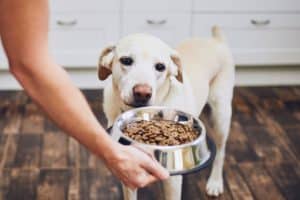Today’s Ask The Jug Dog Q&A is a stinky one!
Why does my dog poop so much? He’s a chocolate Labrador and lately can’t seem to stop pooping! He poops around 7-10 times in a day and it doesn’t seem right. It’s embarrassing! Often, I haven’t brought enough poo bags to the park. Am I doing something wrong or does my dog have a problem?
Thanks for the question Tristan! It’s an interesting question with a few potential reasons as to why it happens. We’re going to answer your question on why your dog poops a lot in a few ways. Let’s begin.
How often should a puppy poop?
One of the biggest challenges with getting a puppy is the housetraining aspect as they can quite literally shit all over your lovely house. Knowing the signs and signals of your puppies digestive system is key to getting over and done with quickly. Your puppy should be pooing around 5 times a day provided they have these three aspects available:
If they are pooping more than 5 times a day then have a think if any of the above is out of the ordinary. If they’re not then let’s take a look at some causes for puppies to poo more than normal.
Why does my puppy poop a lot?
Poor quality food
Poor quality food creates more waste for your puppy to deal with which leads to more poop. Don’t feed your dog substandard food to try and save money as in the long run it will cost you a lot more through having an ill dog that shits in the house.
Sickness
Is your puppy suffering from an illness which is causing diarrhoea?
Overfeeding
Puppies and dogs have a never-ending appetite. As they are growing they will start to eat more and more. If you’re feeding them training treats alongside large meals this could lead to more poops because they’re simply being overfed. A puppy who is overfed will have loose stools so be aware!
Developing stomachs
Puppies developing stomachs can lead to them getting reactions which can lead to diarrhoea. Only feed them good quality food and never scraps from the table. This is especially true with puppies!
How often should an adult dog poop?
A dog which has reached maturity should poop a lot less than puppies, obviously, and by this point should be properly housetrained so they won’t shit in the house. Although every dog has different schedules when it comes to poo and wee you should expect your dog to have bowel movements around 1-3 times a day. If your dog poops a lot more than this then these could be potential causes for you to consider:
Poor quality food
Even though their digestive system has changed and become much more efficient poor quality food can still wreak havoc on a pooches tum. Always feed your dog quality food (see also our guide to vegetables for dogs) and be sure to avoid common allergens.
Sickness
A sick dog could have diarrhoea as one of their symptoms which obviously means they will poop a lot until they’re better.
Overfeeding
A dog that eats a lot will shit a lot. As an adult dog will just eat and eat it’s important as their owner to manage their portion sizes and how many calories they consume in a day. Don’t forget, table scraps and dog treats count as calories and they’re an easy way for a dog to eat too much and have digestive problems which will inevitably lead to a dog who is pooping a little too much!
How often should an elderly dog poop?
Elderly dogs can suffer the same digestive problems that humans do and become more easily constipated or incontinence. If you have a healthy elderly dog then they may still go poo 1-2 times a day but don’t be surprised as they get older and eat less they might go to the toilet only once in a day.
When should dogs poop?
Nature could call at any given time, but for a healthy dog with regular bowel movements then there are three key times they should empty their bowels:
First thing in the morning
Make it both of your routine to either go for a walk or just let them out. Any foods they’ve digested overnight will need to come out first thing this is true even if they’ve been for a poo before bedtime. This is especially important for puppies who do not have the same bowel control as adult dogs.
After a meal
Roughly 30 minutes after a meal a dog may need to poop. For some other dogs like our Jug, Jeff. It could be 6 hours.
Before bed
To make sure your dog doesn’t have any accidents over night take them for a walk or let them out before bed.
Conclusion
If you’ve ever wondered why does your dog poop a lot or never knew what’s a normal amount for a puppy or dog to poo in a day then we hope this article has answered your question. If you’ve discovered that perhaps you’ve been overfeeding or that your dog may be ill then we hope this has been the first step in affirmative action to correct it.
As is usual with dogs, there are no two which are the same so something that’s normal for one do may not be to another. Did you or do you have a dog that shits a lot in the house or outside? Why not share your experience with other owners in our comments section below.
Read our other recommended articles:


